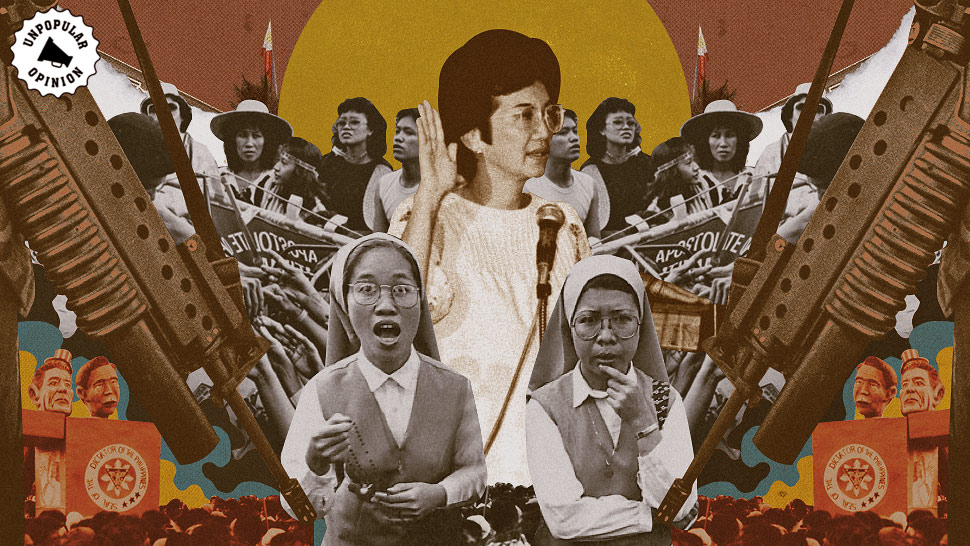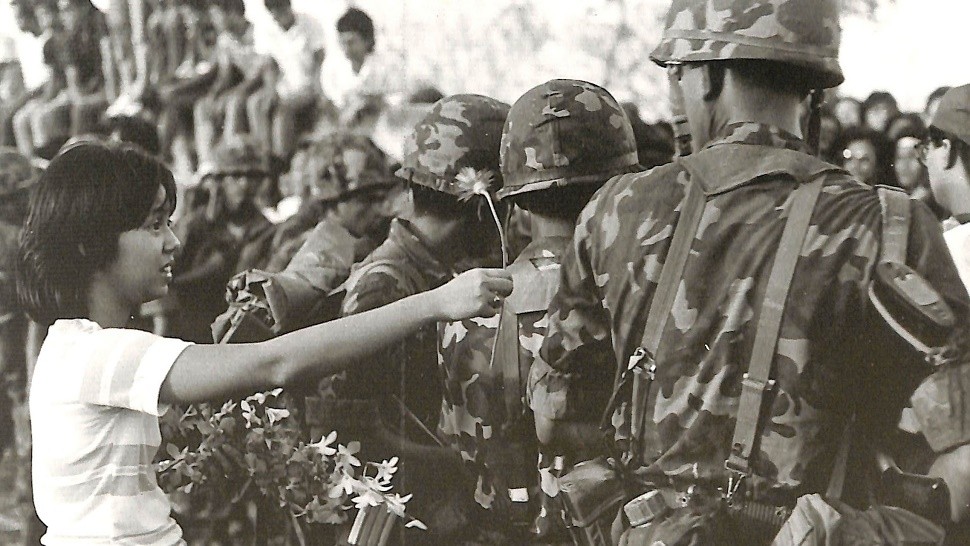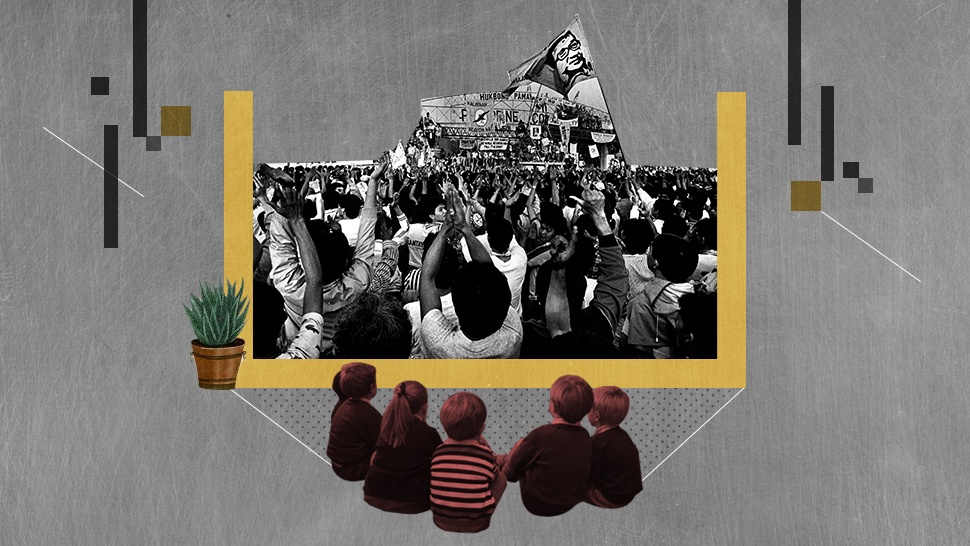A Half Revolution: Making Sense of EDSA '86 and Its Failures

“Citizens, do you want a revolution without a revolution?”
This stirring provocation was delivered by the French revolutionary Maximilien Robespierre before the National Convention in 1792. Both adored and reviled, he stood as the apostle of a defining moment in European history, which saw the unraveling and the destruction of feudal ties and absolute monarchies based on divine exegeses. Whatever opinions that we may have on this figure, whether he was a dedicated servant of the cause of mankind, or its worst tyrant, is pedantic and irrelevant. What is at stake here is this flash of insight: Revolutions are not designed to only last a fortnight.
This was perhaps the greatest tragedy of the so-called EDSA Revolution of 1986. The hagiographers of the moment, stating that there was no seizure or force involved in deposing a decaying and byzantine autocracy, had embellished the affair as a “bloodless uprising.” Understandably, this hagiography would carry itself into great heights, and EDSA would be cited as the impetus of the Autumn of Nations that characterized the late 1980s: a massive show of global resentment and disapproval of the regimes of power that trampled on basic humanity. Unsurprisingly, the collapse of the Iron Curtain, and the Soviet Union itself, can be only interpreted in an angle that involved EDSA: It is a testament of democracy, or in the words of Bill Clinton, of freedom against fanaticism.
But is it really?
Fast forward to 2021, we cringe at these episodes of “victories”—of victories contra totalitarianism, of victories against oppression, of victories against dictatorships. We no longer share the exaltations or the mutterings of the pundits and journalists of the past 30 years or so. One by one, individuals and groups are beginning to realize that their liberation from the supposed domination of one system would only pave the way for another. This can be said of the fate of the Philippines that is anchored to this single celebration.
In 1987, just barely a year after this so-called bloodless uprising, the deputies and constables of the state had opened fire on the peasant farmers in Mendiola, culminating into a massacre. Almost immediately, the defenders of these actions would justify the response as a fight against communism. Isn’t communism, the bogeyman that was paraded in propaganda, the worst of all repressions? Ironically, communism in the Philippines would not be reviled as it is now had the government recognized it and its supporters as early as 1946. But no, the money from the War Reparations was too tempting to be resisted, and the delegates of the populist-socialist Democratic Alliance were excluded, inaugurating an unnecessary ongoing conflict that has killed thousands of lives, all in the name of the fat-cat barons, kingpins, and banks.
The same justifications would be recycled over and over in the succeeding years and decades. The so-called promises of the state on upholding basic services, providing welfare, and altering the status quo have melted as quickly as they were scrapped. Political dynasties are still here, because as one framer of the Constitution would put it, banning political dynasties is against the principles of having everyone run for public office. This same framer would be against it because she has a relative working in the National Economic Development Agency of the first Aquino regime. These, and other ridiculous excuses can be found at the very Constitution that this “revolution” had birthed: a document that merely added flowery prose here and there, while keeping the order of things untouched. For some reason or another, the supporters of this document have delivered nothing, and one can even conclude that the Commission that was drafted was a sham.
The so-called promises of the state on upholding basic services, providing welfare, and altering the status quo have melted as quickly as they were scrapped.
The genealogy of this revolution was an aborted military putsch by elites within the military. The man who spearheaded its fruition was quoted to have said that he had to do this so that the country would not fall either to the extreme left or right. This coup d’état almost fizzled: Then a religious figure called on the citizens to rally in front and offer their support. In the sequences of events that followed, the sinking ship of the tottering Marcos regime crumbled, as cronies, capos, and military chiefs began to withhold their oath of loyalty. Then it concluded in the most anticlimactic ordeal: The autocrat would flee with his entourage via a helicopter. After that, there were no repercussions, nor trials, just token pursuits of ill-gotten wealth. A fitting conclusion to a soap-opera where there is no escape.
EDSA '86 In 2021
A generation since this mess is a generation wherein apathy and cynicism have become rife. This is a part of a global shift: In the age of no ideologies (since liberalism is the hegemonic way for us on doing things), everything must be obscured and sanitized. Politics is a game of management. Economists are upgraded to technocrats. Social activism reduced to sloganeering, of incremental acts similar to a bunch of customers threatening to speak to the manager. The spectrum across all persuasions settled down and told themselves that there is no alternative from this current option. Corporate social responsibility is more doable than raising the minimum wage. The only concern we have is inclusivity in corporate boardrooms. Our professional and existing selves have merged to facilitate the needs of HR. And so, they rested on their laurels.
In retrospect, this “pragmatism” was a total and absolute catastrophe. No longer having principles or any shred of responsibility to its people, the ruling classes all over the globe would parrot that they are here to protect us from our nightmares, the lurking unknown in which extremism and barbarism are rife. The War on Terror is still ongoing, the two economic crashes of this century have made prospects worse for everybody, and in general, the outlook that we have is bleak. The populist reaction would be one of the anti-theses that offered a liberation and a silver bullet to our inaction, and hence its traction. But overall, it had mixed results: for any system that limits itself in perpetual reforms will find itself petered out and alone. Our nationalism that was previously esteemed within and without has morphed into a mélange of frustrations and a huge dash of inferiority complex. As Pinoy Pride, our opium wanes on its effectiveness, the frustration that we have has turned into rage, confusion, and despair.
A generation since this mess is a generation wherein apathy and cynicism have become rife.
These disappointments cannot be blamed on EDSA as an event alone. But EDSA did play a role of introducing an impotent program of the most vapid of reformisms. Looking closely at what we have as a government, we can say that this is the logical conclusion of the underwhelming presidency of its immediate predecessor. The man was elected in a gasp of a breath by the people for emancipation, bolstered by the passing of its icon. But what it accomplished was to destroy the hopes and dreams of many. It therefore makes sense that this regime would be upended by a president and a cabinet that displayed open disregard for the hypocrisies that it inherited.
Time and time again, what the Marcoses are doing is not historical revisionism: It is denial, the denial of their atrocities. Revisionism is a terrible choice of describing their acts, because history's praxis will be always the stories or narratives that we tell to ourselves, and we alter those stories either because of new evidence or the order that benefits from it. The popularity of Marcos-stoked conspiracies, like its version of history, should and must be viewed from an existential aspect. Their resonance is a confirmation of a nation in despair, and having no vision aside from what is presented to us, we retreat to the phantasms of the past glories, even if they are no glories at all.
We have this feeling of dread in our hearts and minds. We have this undercurrent of trying to just make ourselves disappear. In the age of isolation caused by this pandemic, it is a sentiment that is echoed and murmured. We are at a crossroads, and as long as we continue to uphold a half-revolution, all efforts will come into naught. The ghosts of the past will continue to reign, and we shall continue to amuse ourselves and numb our pain. If this process goes on without interruptions, the road to purgatory is just around the corner. And that road will be our graveyard; it is the betrayal of the ancestors who fought and died in this soil of ours.
Which way do we go now, Philippines?








